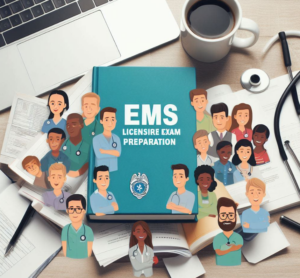 The cultivation of a dependable environment in the medical sphere is crucial, particularly in the unpredictable domain of emergencies. The key players in this sphere are the Emergency Medical Services (EMS) professionals, who are required to swiftly and efficiently provide critical medical assistance in times of urgency. Ever present in public safety, the effectiveness of these professionals has a significant impact on the subsequent medical outcomes of patients in distress. To instill dependability and credibility in these individuals, EMS licensure plays an essential role.
The cultivation of a dependable environment in the medical sphere is crucial, particularly in the unpredictable domain of emergencies. The key players in this sphere are the Emergency Medical Services (EMS) professionals, who are required to swiftly and efficiently provide critical medical assistance in times of urgency. Ever present in public safety, the effectiveness of these professionals has a significant impact on the subsequent medical outcomes of patients in distress. To instill dependability and credibility in these individuals, EMS licensure plays an essential role.
Penetrating further into the understanding of EMS Licensure, it is evident that it primarily acts as an instrument to assure the quality of EMS professionals. The fundamental objective of this tool is to augment public safety in the medical sphere. Prior to reaching this level, these medical professionals must initially acquire certification, which is achieved upon successfully passing a national cognitive examination.
The journey of professional growth does not end with certification. These individuals must then strive to attain licensure, which operates under the authority of each state’s regulatory system. This step extends the role of EMS professionals by enforcing a standard of practice and holding them accountable.
These professionals not only exhibit their commitment to follow a code of professional conduct but also ensure their conformance to stringent quality guidelines. It acts as tangible evidence of the individual’s possession of the necessary education, appropriate skills, and relevant experience required to deliver superior emergency medical care.
EMS Licensure serves to foster a sense of predictability and consistency in the medical environment, which tends to be inherently erratic and turbulent. By ensuring that qualified and licensed professionals are present to address medical emergencies, the trust and reliability vested in the healthcare system are subsequently boosted. With each licensed member’s dedication and competence, a significant shift can be made within the healthcare environment to become more dependable and trustworthy. Cultivating a trustworthy medical environment, therefore, gains prominence in the broader picture of public health and safety.
The Rigid Path To EMS Licensure
Attaining the title of an EMS licensee is a venture that requires unwavering commitment, determination, and tenacity. This process is by no means simple or effortless and justifiably so. The reason for this rigidity lies in the intense responsibility entrusted, which relates directly to public health and safety. The part of this role involves saving lives under demanding circumstances, which permits no room for error. Therefore, the journey towards achieving licensure is stringent and relentless.
During this rigorous process, a multitude of competencies need to be developed. The prerequisite skill sets that a candidate needs to acquire range from patient assessment to the proper handling of medical emergencies. It is also utterly essential for the individual to demonstrate proficiency in emergency equipment usage and executing direct care under stressful situations.
This intensive module aims to cultivate trust, assuring the public about the proficiency and skill set of EMS professionals. While this might seem rigorous, it becomes essential when the role involves matters of life and death, and consequently, every second becomes critical.
Another interesting aspect of EMS licensure relates to the level of practice it corresponds to. The spectrum ranges from an Emergency Medical Responder (EMR) at the basic level to the more advanced Paramedic. The purpose of these differentiations is to ensure the proficiencies of individuals align with their specific roles and responsibilities. Each level has its unique set of duties that correspond to the allotted designation.
The emergency medical professionals at each one of these licensure levels are trusted with tasks that align with the contemporary measures of the medical practice. This approach aids in differentiating responsibilities and assures the delivery of quality healthcare, as the individuals are considered adept as per their respective licensure.
The path to EMS licensure may be rigid, but it is a necessity to uphold the quality of patient care. This method ensures that only qualified, competent, and skilled individuals cater to public health, providing lifesaving care when time is of the essence. Consequently, EMS licensure operates as a beacon for quality in healthcare, as it sets a stringent standard for those involved in emergency medical services. It assures that practitioners are ready to step in, save lives, and provide immediate and impactful medical assistance whenever the situation demands.
EMS Licensure as a Beacon of Trust in a World of Uncertainties
 EMS licensure stands as a symbol of confidence in an unpredictable world, especially in instances when individuals find themselves in their most fragile state. The license given to EMS professionals showcases that they possess the requisite understanding, abilities, and integrity to deliver vital care in critical times.
EMS licensure stands as a symbol of confidence in an unpredictable world, especially in instances when individuals find themselves in their most fragile state. The license given to EMS professionals showcases that they possess the requisite understanding, abilities, and integrity to deliver vital care in critical times.
The existence of a license alone isn’t adequate. Maintaining its value plays an equally significant part. It is incumbent upon EMS professionals to continually update their knowledge base to stay in tune with the latest advancements in research, emerging technologies, evolving methodologies, and updated healthcare protocols. In light of this, license renewal is not just a formality but a requirement in many cases, closely tied to continuing education and other professional development pursuits.
Scheduled recertification and license renewal timelines contribute to the assurance that EMS professionals can consistently meet the quality standards set forth, thereby maintaining the faith that patients and the wider society instill in their ability to care. Each license cycle reevaluates their eligibility, ensuring they function in alignment with the current medical expectations and public needs.
Consider EMS licensure as a beacon, guiding the public to dependable, consistent, and high-quality healthcare. The licensure process serves as a motivating factor for EMS professionals to stay devoted, self-assured, and proficient throughout their careers. The relevance of licensure isn’t only confined to the EMS professionals. It extends its implications to the broader community it serve, constantly demonstrating a shared resolve towards a safe, efficient, and reliable healthcare environment. It is a testament to their medical competence, reinforcing the trust that needs to exist between EMS professionals and the community. Simply put, it reflects their unwavering commitment to uphold public safety and welfare while adhering to professional ethics and standards.
